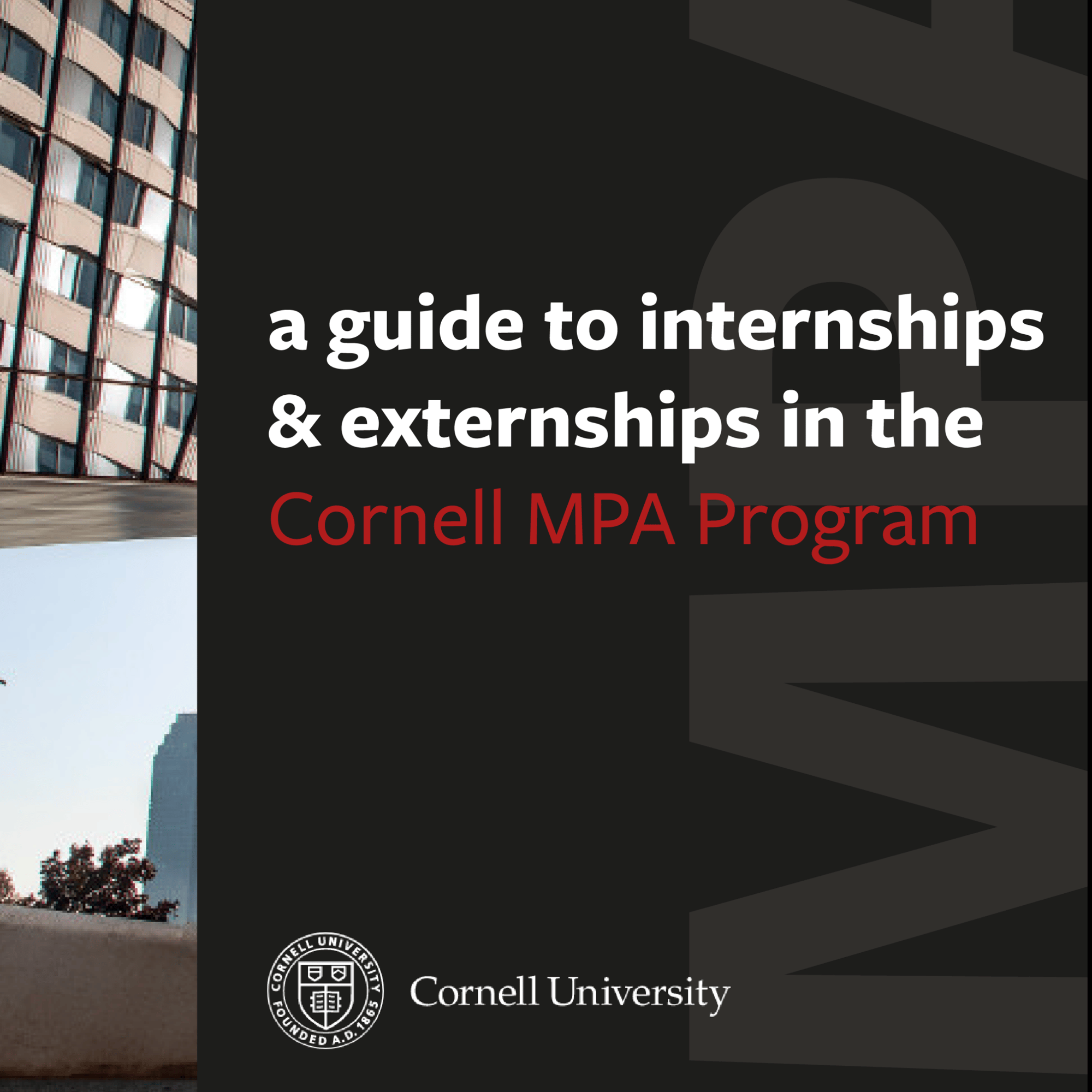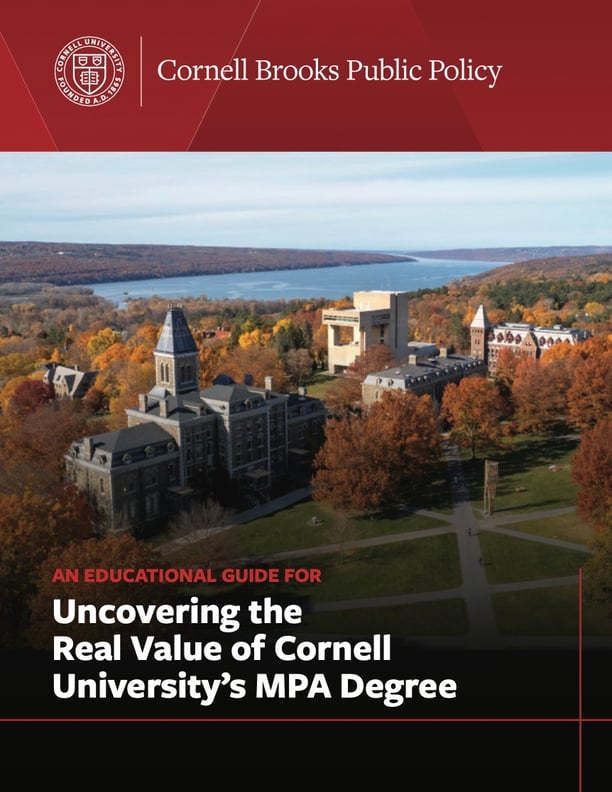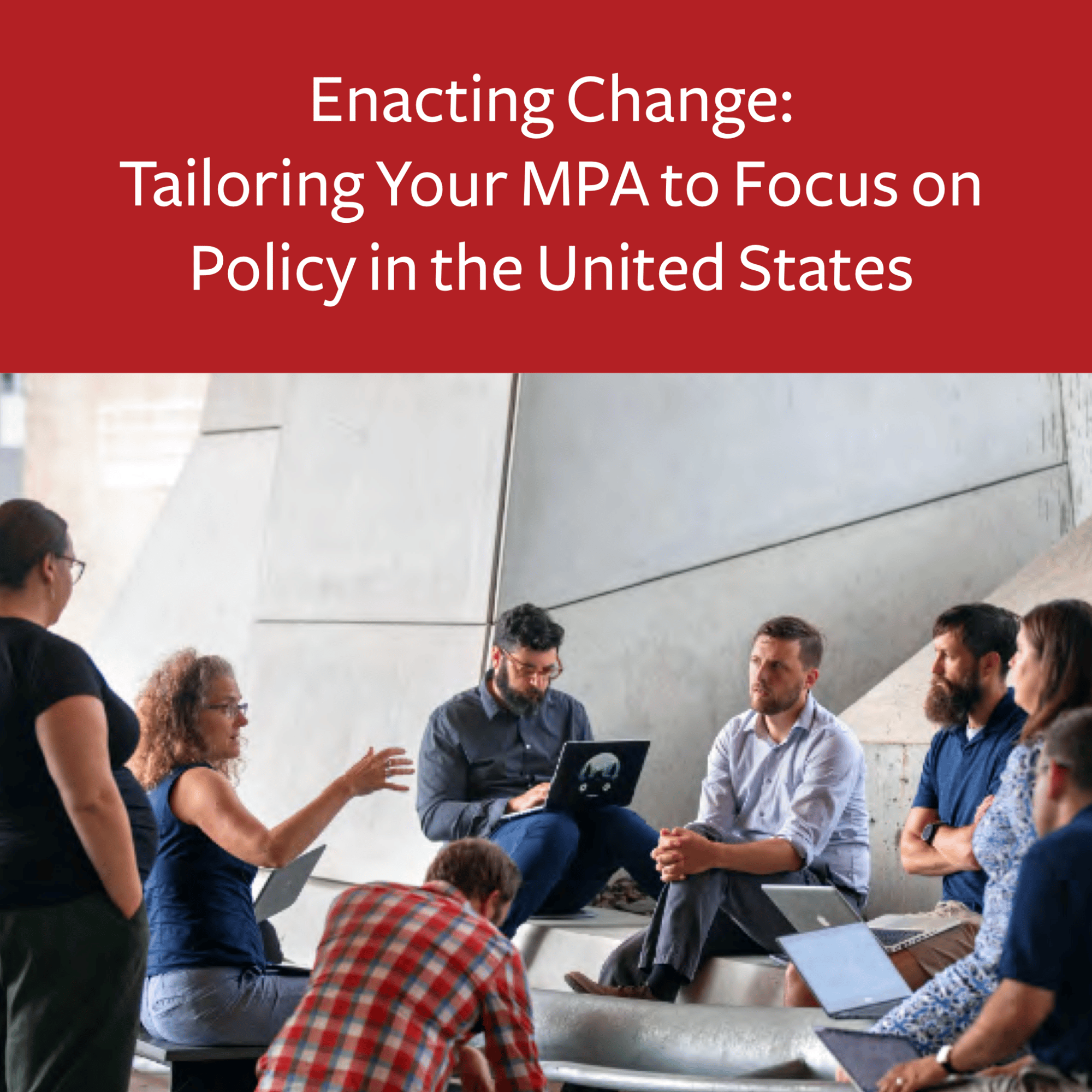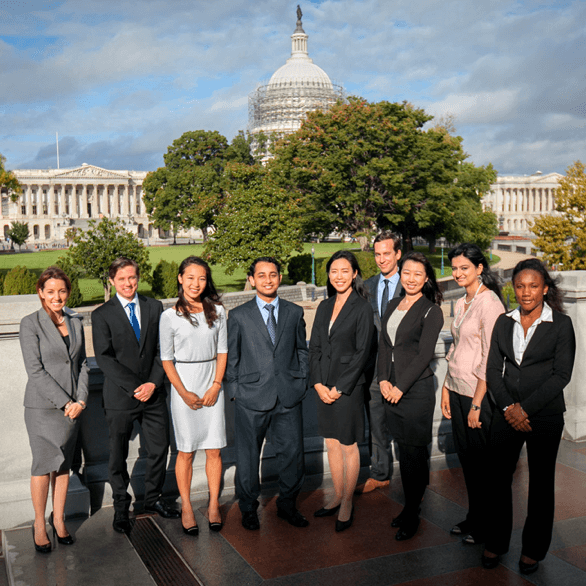MPA students concentrating in Economic Policy explore ways in which public policy affects economic and financial decision making, and vice versa.
Learning by Doing: A Better Approach to Professional Education
It is one thing to learn important skills in a classroom; it’s quite another to experience them firsthand. Whether you want to learn how nonprofits work with government to implement policy, or how to address agricultural challenges in rural communities, practical application of skills will not only increase your understanding of your field, but will give you the knowledge and experience required to advance your career.

At Cornell University, we believe in the power of hands-on learning, which is why we offer a variety of ways to enhance your Master of Public Administration (MPA) degree through tangible, real-world experiences. Keep reading to discover the opportunities offered through the Cornell Jeb E. Brooks School of Public Policy, learn how hands-on learning can bolster your competitiveness on the job market, and hear stories from current MPA students who are preparing themselves for thriving careers through experiential learning.
Understanding the Value of Experiential Learning
Experiential learning is the process of learning by doing, and, more specifically, learning through reflection on doing. This approach to learning moves beyond the classroom and strives to facilitate a more active and involved way of developing skills.
While the general concept of learning through experience is ancient, as an articulated educational approach, experiential learning is of much more recent. Beginning in the 1970s, David A. Kolb helped to develop the modern theory of experiential learning, drawing heavily on the work of John Dewey, Kurt Lewin, and Jean Piaget. Kolb defines learning as “the process whereby knowledge is created through the transformation of experience.” For Kolb, experience is the source from which all learning stems.

Kolb's experiential learning style theory is typically represented by a four-stage learning cycle:
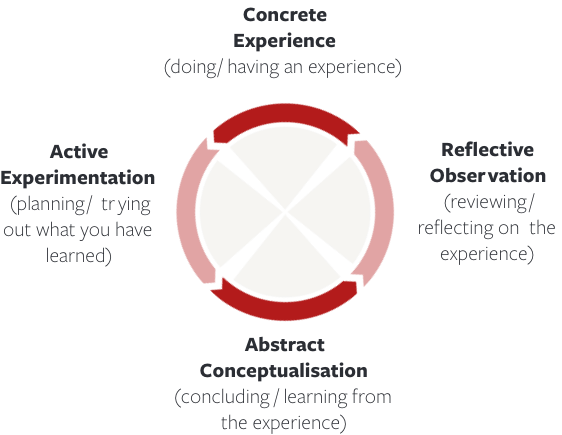
- Concrete Experience: The learner encounters a new experience or situation.
- Reflective Observation: The learner reflects on the experience.
- Abstract Conceptualization: The reflective observation gives rise to a new idea or modification of an existing concept.
- Active Experimentation: The learner then applies their ideas to the world around them and observes the outcomes.
The learning cycle can begin at any one of the four points – and should really be approached as a continuous spiral. When the new ideas are put into action, they become the basis for a new cycle of experiential learning.

How the Cornell Brooks School MPA Promotes Experiential Learning
The MPA degree is a professional degree for students seeking a career in public management and public policy. MPA programs develop the skills and techniques used by managers to implement policies, projects, and programs that resolve important problems within their organization and in society.
The Cornell Brooks School MPA is a two-year graduate program through which we prepare individuals for management and leadership careers in public service. Our MPA offers a solid foundation of core coursework in management, economics and finance, and quantitative analysis.
Direct experience with professional work in public affairs is a key component of our MPA curriculum, serving as a practical complement to formal academic study. Hands-on learning gives students an accurate perception of the kind of work they’ll be involved in post-graduation and provides invaluable experience that students will take into careers that make a tangible difference in people’s lives.
Our students often say that they’re drawn to the Cornell Brooks School MPA because of the emphasis we place on experiential learning, with hands-on opportunities offered both inside and outside of the classroom. In addition to internship and externship opportunities, as well as numerous courses with experiential learning components, we offer two intensive consulting courses that are client-based. Graduates regularly cite their consulting engagements as key in helping them develop the skill set they need to be successful in their careers.
Opportunities for Real-World Learning at Cornell
In the Cornell Brooks School MPA program, there are several options for fulfilling the Practical Experience requirement for the MPA. Real-world consulting opportunities, internships, off-campus study, and Capstone experiences help you develop the skill set you need to be successful in your future careers.
To fulfill the Practical Experience component of the MPA degree, most students choose to complete an internship in the summer between the first and second year of study, or an externship while enrolled in one of the off-campus semester programs.
Internships are available both in the United States and abroad in public, private, and nonprofit organizations across the field of public affairs.
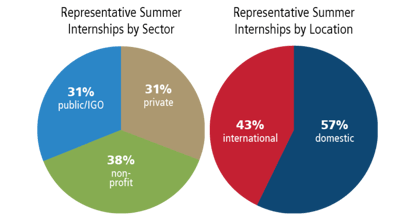
Some of our recent Brooks MPA students have been placed in internships with the following representative organizations:
| Accenture | International Labour Organization |
| Amazon | New York City Office of Management and Budget |
| Atkinson Center for a Sustainable Future, Cornell University | Port Authority of New York and New Jersey |
| Boston Redevelopment Authority | Tata-Cornell Institute for Agriculture and Nutrition, India |
| Brookings Institute | United Nations Development Programme |
| Calvert Investments | UNESCO |
| Cato Institute | UNICEF |
| China Development Bank | UN Women |
| Citibank | USAID |
| Council on Foreign Relations | United States Department of State |
| Deloitte Tax, LLP | World Bank |
| Environmental Defense Fund | |
| International Rescue Committee |
For more information, please visit: https://publicpolicy.cornell.edu/ciw/internships/
Externships and Off-Campus Programs
At the Cornell Brooks School, we offer a graduate education spanning the globe, which enables you to live and work in Albany or Washington D.C. for a semester while enrolled in MPA coursework. Each of these off-campus programs is designed to complement your studies and provide opportunities for networking and exposure to challenging professional environments.
Students who participate in our off-campus semesters receive academic and professional support from faculty, staff, and alumni. In addition, if you plan your schedule strategically, you may be able to extend a semester externship to a six-month commitment by combining an off-campus study semester with a summer internship. Students are also paired with an alumni mentor either working in their organization or in the field they would like to join after graduation. This mentor relationship is a hallmark of our off-campus experience and a key factor in students landing jobs after graduation.
Our Externship Programs allow you to gain professional experience in various government agencies, private sector firms, or non-government organizations. If you are interested in pursuing this opportunity, you should begin planning this with your academic advisor as early as possible.
Opportunities for off-campus study include Washington D.C. and Albany, NY.

Washington DC Externship Experience
As part of your graduate studies at the Cornell Brooks School, you have the opportunity to spend a semester living, studying, and working in the nation’s capital. While Washington D.C. serves as the heart of the United States federal government, the city is also host to a staggering array of inter-governmental organizations, consulting firms, and nonprofit organizations.
Through the Cornell in Washington internship semester, students undertake an externship for up to forty hours per week while completing professional development exercises through an intensive externship course. Participants also enroll in a colloquium course featuring alumni speakers.
Representative externship organizations in Washington D.C. include:
| UNDP | District of Columbia Public Schools |
| World Bank | U.S. Department of State |
| National Public Radio | World Food Programme |
| White House Domestic Policy Council | International Monetary Fund |
For more information, please visit: Cornell in Washington.
New York State Capital Semester
Through this program, students are placed in a paid internship with the New York State Legislature, while earning a full semester of credits. Capital Semester students are full-time Assembly or Senate Interns who spend the spring semester living, working, and studying in Albany, a vibrant and student-centered city. Students learn how the New York State Legislature functions through direct experience and formal instruction.
Wherever your policy interests lie — higher education, healthcare, environmental conservation, economic development, or elsewhere — Cornell offers the unique opportunity to help students begin careers in public service, public policy, politics and government.
For more information, please visit: New York State Capital Semester
The Public Exchange Service Experience
Another opportunity for practical experience is the Public Service Exchange. This program represents a unique service-learning partnership with nonprofit and government agencies located primarily in Tompkins County as well as in the greater New York region.
Students may enroll in Consulting for Government and Nonprofit Organizations (PADM 5900) course during their first or second year. Working in small teams, students address a problem, issue, or opportunity for a client using a consultative, or “clinical” approach. The types of activities that students will engage in are consistent with a traditional public sector consulting firm.
Students gain valuable hands-on experience while partnering with these clients to mitigate or solve public or management problems. Many of these partner agencies and nonprofit organizations end up offering internship or ongoing consulting opportunities to students, as a result of consulting engagements. A representative sampling of previous clients includes:
| Cancer Resource Center of the Finger Lakes | Ithaca Department of Public Works |
| City of Ithaca Department of Planning and Urban Renewal | Ithaca Public Education Initiative |
| City of Ithaca Downtown Partnership | Ithaca Youth Bureau |
| Cornell Cooperative Extension of Tompkins County | Mutual Housing Association of Tompkins County |
| Cornell United Way | New York City Housing Authority (NYCHA) |
| Cornell University International Students and Scholars Office | Paleontological Research Institution and its Museum of the Earth |
| Cornerstone Family Healthcare | Tompkins County Community Foundation |
| Health and Human Services Coalition of Tompkins County | Tompkins County Office for the Aging |
| Ithaca Area Wastewater Treatment Facility | Upstate New York Safety Coalition Task Force |
Capstone Project
To fulfill the Professional Writing Requirement of the MPA degree, most students participate in the Capstone program, an in-depth, semester-long program designed for second-year MPA students. For each Capstone project, students form consultancy teams that propose relevant and actionable solutions to well-defined policy or management problems posed by client organizations. The experiential learning and teamwork required in each Capstone project will enhance students’ abilities as public affairs professionals and leaders.
Capstone projects are multidisciplinary and experiential in nature, and students have the opportunity to learn from each other and from faculty and staff resources across the University, as well as from Cornell Brooks School contacts in the field. Over the course of the program, students learn about managing projects and undertaking policy analysis within the constraints of various political environments and organizations. They also gain professional and public service experience and learn to manage a team project.

We take tremendous pride in the work that students accomplish through the Capstone program each semester. Our partnerships with government and nonprofit organizations result in new programs, strategies, policy assessments, business plans and more; these deliverables are valuable to our clients and improve people’s lives. The projects are also an indispensable component of the Cornell Brooks School MPA curriculum, providing students with important hands-on research and leadership experience.
Determining the Best Option for You
The type of experiential learning opportunity a student pursues may depend on the concentration of study. At the Cornell Brooks School, we have eight broad concentrations from which to choose.
-
-
Environmental and Sustainability Policy
MPA students concentrating in Environmental and Sustainability Policy tailor their courses to gain an understanding of current economic, social, political, technical and legal issues regarding the restoration and management of our natural environment, as well as engineering, economic and legal perspectives for analyzing and formulating policy at all levels of government.
-
MPA students choosing the Data Science concentration develop the capacity to apply advanced data science techniques to analyzing public affairs problems.
-
Social Policy: Health, Education, and Inequality
MPA students concentrating in Social Policy: Health, Education, and Inequality, focus on the design, management, and evaluation of public sector programs across various policy areas, including health, education, child and family policy, housing and urban policy, welfare, and transfer programs. This concentration introduces students to problem formation, identification of policy alternatives, policy implementation, and policy evaluation.
-
International Policy and Management
MPA students concentrating in International Policy Management gain a high-level understanding of the role of international organizations in global policy and politics, how these organizations interact with each other and with non-governmental organizations, and best practices in affecting change on a global scale.
-
Public and Nonprofit Management
MPA students concentrating in Public and Nonprofit Management tailor their studies for careers as general managers in the public sector, or as leaders of domestic or international government agencies or nonprofit organizations.
-
The STIP concentration is intended to assist MPA students in developing the capacity to lead, coordinate, and utilize inputs from teams of specialists to make and shape policy around disruptive and transformative technologies.
The goal is for you to leave the Brooks School prepared to compete as one of the best-of-the best in your respective field, recognizing that in the course of your career, you may make several changes in focus and direction. Our curriculum is designed to balance general management skills with applications to specific areas of public affairs.

Further Augment Your MPA
If you’re interested in giving yourself a competitive edge, Cornell offers complementary and dual degree options along with graduate certificate programs that you can pursue in addition to your MPA.
Complementary and Dual Degree Options
Cornell offers a complementary degree option and a dual degree option for competitive, driven MPA students looking to augment their MPA with an additional degree.
- Master of Public Health (MPH): Cornell University offers a Master of Public Health (MPH) Program to help build public health leaders who are inspired and trained to ensure the health of people, animals, and the world in which we live.
- Master of Business Administration (MBA) and Juris Doctor (JD): Applicants who wish to pursue a Cornell MBA or JD along with their MPA degree may work out a complementary program of study if they apply to and are accepted by both programs. Students may then apply up to twelve credits of the complementary professional degree program (MBA or JD) toward their MPA.
- Master of Public Administration (MPA)/Master of Health Administration (MHA): This dual degree option enables students to complete both degrees in three years while eliminating duplicate coursework. Students must apply and be accepted to both programs. The goal of this program is to enable students to combine training in public administration with training in health administration, health policy, and the tools of public health.
Graduate Certificate Programs
The Cornell Brooks School offers three graduate certificate programs, which are open to current graduate students in good academic standing. These certificate programs provide you with specific knowledge and tools for working in the respective area of study. The additional credentials that these certificates provide may offer you a competitive edge in your future careers.
- Environmental Finance and Impact Investing (EFII) Fellows
- Infrastructure Project Management and Finance (IPMF) Fellows
- Systems Thinking, Modelling, and Leadership (STML) Certificate
For detailed information about the program requirements, you will want to consult our current Program Handbook. For specific information on available courses and how they meet program requirements, please consult the current Course Guide.

“I was in charge of building the company structure from the ground up. Early on, for example, since California’s legislation on driverless trucks was so restrictive, we had to expand our footprint to another state to develop a driverless fleet facility. I was tasked with locating a new state with lenient legislation for autonomy. It was a rigorous process, but I was able to convince the board and the company to expand into Tucson, Arizona. We effectively doubled the team size over the course of a year. The experience and the lessons I gained from the collaborative Capstone project has certainly helped me a lot throughout the process.”
— Vivian Sun, Cornell Brooks School MPA Alumni

Subscribe to Policy in Action
Want to read success stories similar to Vivian’s? Subscribe to the Cornell University MPA blog, Public Policy in Action. We hope to cultivate a community of exceptional students who have the analytical, leadership, and communication skills necessary to succeed in serving others across the public, private, and nonprofit sectors.
Career & Professional Development at Cornell
The Office of Career Management provides the tools you need to put your MPA degree to work in the competitive public affairs job market, whether you’re a current student or an alum. Our Career Services Staff will help you assemble an individualized career plan and then provide you with everything you require to succeed, from how to write your resume and cover letter to how to network and conduct yourself during a job interview. We’re committed to your professional development and the advancement of your career.
How are recent graduates faring in the job market? Take a look at our statistics. And for more information, contact the Office of Career Management.

Financing Your Ivy League MPA
Figuring out how to finance an Ivy League education may seem intimidating at first. You may be surprised to learn that Cornell University’s MPA program is actually more affordable than similar programs at other schools. Combined tuition, fees, and overall living expenses for Cornell’s two-year MPA range from $20,000 to $40,000 less than our competitors.
.png?width=900&name=2021-22%20Tuition%20Comparison%20(horizontal).png)
Whether or not you receive one of these fellowships, there are other opportunities for funding that students can pursue to offset the cost of graduate school. These opportunities include part-time employment, external scholarships, and federal loan forgiveness. We understand the commitment our students make when choosing to further their education. At Cornell, we want to make getting your MPA as easy as possible.
Admissions to Cornell’s MPA Program
Our Admissions Committee evaluates applicants on the basis of potential for academic success at Cornell, as well as demonstrated commitment to a career in public service. Through our rigorous application process, we look for applicants who will serve as change-makers across the global public, private, and nonprofit sectors — highly capable professionals who think creatively and are passionate about confronting some of the world’s most challenging public policy issues.
Our MPA requires strong analytical abilities and quantitative skills. While a background in the social sciences is helpful, the breadth of public affairs as a field of study and practice invites interest from an expansive range of professional fields, including the arts, business, engineering, and the natural sciences.
-
- Complete Cornell’s Online Graduate School Application. For questions pertaining to any technical issues or errors, contact the Graduate School office at 607-255-4884.
- Submit unofficial copies of your college and university transcripts. An official paper transcript is required for all admitted students before matriculating.
- There is NO GRE requirement.
- Submit your résumé and two letters of recommendation.
- Applicants for whom English is a second language will need to meet minimum scores on either the TOEFL or IELTS exams. Required minimum scores on the TOEFL exam are: writing 20, listening 15, reading 20, speaking 22, as well as an overall combined score of at least 100. Our field requirements for the IELTS is an overall score of at least 7.0.
- Submit a Statement of Purpose. See detailed information below for completing this submission.
- You will be sent email instructions to participate in an online interview to complete your application.
-
Statement of Purpose (500 words maximum)
- Detail why you are interested in applying to the MPA program.
- Describe how your personal and/or professional experiences have led to your interest in Cornell University’s Brooks School MPA program and how these experiences contributed to your interest in public administration.
- Describe your future goals in the area of public administration and how you would use an MPA graduate education to make a positive impact in this area.
-
Once Cornell receives your application, you will receive an email with information about completing an online interview. It will include login information and detailed instructions.
Connect with Us Today
Are you ready to experience real-world learning while tackling some of the world’s most complex policy challenges? You’re in the right place. We are looking for students of exceptional quality who have the analytical, leadership, and communication skills necessary to succeed in a career serving the public in government, nonprofit, or for-profit sectors. Get started today!




